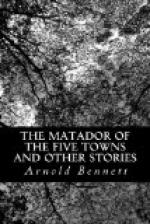in the afternoon from a week’s visit to London,
and he was glad to get back again. He loved his
wife and adored his daughter, in his own way, and
he enjoyed the feminized domestic atmosphere of his
fine new house with exactly the same zest as, on another
evening, he might have enjoyed the blue haze of the
billiard-room at the Conservative Club. The interior
of the drawing-room realized very well Peake’s
ideals. It was large, with two magnificent windows,
practicably comfortable, and unpretentious. Peake
despised, or rather he ignored, the aesthetic crazes
which had run through fashionable Hillport like an
infectious fever, ruthlessly decimating its turned
and twisted mahogany and its floriferous carpets and
wall-papers. That the soft thick pile under his
feet would wear for twenty years, and that the Welsbach
incandescent mantles on the chandelier saved thirty
per cent, in gas-bills while increasing the light by
fifty per cent.: it was these and similar facts
which were uppermost in his mind as he gazed round
that room, in which every object spoke of solid, unassuming
luxury and represented the best value to be obtained
for money spent. He desired, of a Saturday night,
nothing better than such a room, a couple of packs
of cards, and the presence of wife and child and his
two life-long friends, Sneyd and Lovatt—safe
men both. After cards were over—and
on Lovatt’s account play ceased at ten o’clock—they
would discuss Bursley and Bursley folk with a shrewd
sagacity and an intimate and complete knowledge of
circumstance not to be found in combination anywhere
outside a small industrial town. To listen to
Sneyd and Mrs Peake, when each sought to distance
the other in tracing a genealogy, was to learn the
history of a whole community and the secret springs
of the actions which constituted its evolution.
“Haven’t you any news for me?” asked
Peake, during a pause in the talk. At the same
moment the door opened and Mrs Lovatt entered.
“Eh, Auntie Lovatt,” he went on, greeting
her, “we’d given ye up.” Mrs
Lovatt usually visited the Peakes on Saturday evenings,
but she came later than her husband.
“Eh, but I was bound to come and see you to-night,
Uncle Peake, after your visit to the great city.
Well, you’re looking bonny.” She shook
hands with him warmly, her face beaming goodwill, and
then she kissed her half-sister and Ella, and told
Sneyd that she had seen him that morning in the market-place.
Mrs Peake and Mrs Lovatt differed remarkably in character
and appearance, though this did not prevent them from
being passionately attached to one another. Mrs
Lovatt was small, and rather plain; content to be
her husband’s wife, she had no activities beyond
her own home. Mrs Peake was tall, and strikingly
handsome in spite of her fifty years, with a brilliant
complexion and hair still raven black; her energy was
exhaustless, and her spirit indomitable; she was the
moving force of the Wesleyan Sunday School, and there
was not a man in England who could have driven her
against her will. She had a fortune of her own.
Enoch Lovatt treated her with the respect due to an
equal who had more than once proved herself capable
of insisting on independence and equal rights in the
most pugnacious manner.




